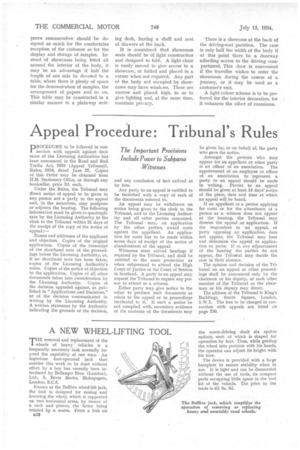Appeal Procedure: Tribunal's Rules
Page 52

If you've noticed an error in this article please click here to report it so we can fix it.
The Important Provisions Include Power to Subpwna 'Witnesses
PROCEDIJRE to be followed in connection with appeals against decisions of the Licensing Authorities has been announced in the Road and Rail Traffic Act, 1933 (Appeal Tribunal), Rules, 1934, dated June 27. Copies of this Order may be obtained from H.M. Stationery Office, or through any bookseller, price 2d. each.
Under the Rules, the Tribunal may direct notice of appeal to be given to any person not a party to the appeal and, in the meantime, may postpone or adjourn the hearing. The following information must be given in quadruplicate by the Licensing Authority to the clerk to the Tribunal within 21 days of the receipt of the copy of the notice of appeal:— Names and addresses of the applicant and objectors. Copies of the original application. Copies of the transcript of the shorthand note of the proceedings before the Licensing Authority, or, if no shorthand note has been taken, copies of the Licensing Authority's notes. Copies of the notice of objection to the application. Copies of all other documents taken into consideration by the Licensing Authority. Copies of the decision appealed against, as published in "Applications and Decisions," or of the decision communicated in writing by the Licensing Authority. A written statement by the Authority indicating The grounds of the decision, and any conclusion of fact arrived at by him, Any party to an appeal is entitled to be furnished with a copy of each of the documents referred to.
An appeal may be withdrawn on notice being given to the clerk to the Tribunal, and to the Licensing Authority and all other parties concerned. The Tribunal may, on application by the other parties, award costs against the appellant. An application for costs has to be made within seven days of receipt of the notice of abandonment of the appeal. Witnesses must attend hearings if required by the Tribunal, and shall be entitled to the same protection as when subpcenaed to attend the High Court of Justice or the Court of Session in Scotland. A party to an appeal may request the Tribunal to require any person to attend as a witness.
Either party may give notice to the other to produce such documents as relate to the appeal or to proceedings incidental to it. If such a notice be not complied with, secondary evidence of the contents of the documents may be given by, or on behalf of, the party who gave the notice.
Amongst the persons who may appear for an appellant or other party is an officer of an association. The appointment of an employee or officer of an association to represent a party to an appeal should be made in writing. Parties to an appeal should be given at least 14 days' notice of the place, date and time at which an appeal will be heard. If an appellant or a person applying for costs or for the attendance of a person as a witness does not appear at the hearing, the Tribunal may dismiss the appeal or application. If the respondent to an appeal, or party opposing an application, does not appear, the Tribunal may hear and determine the appeal or application ex parte. If at any adjournment of the hearing the parties do not appear, the Tribunal may decide the case in their absence.
The opinion and decision of the Tribunal on an appeal or other proceedings shall be announced only by the chairman or his deputy, or such other member of the Tribunal as the chairman or his deputy may direct. The address of the Tribunal is King's Buildings, Smith Square, London, S.W.1. The fees to be charged in connection with appeals are listed en page 730.




























































































